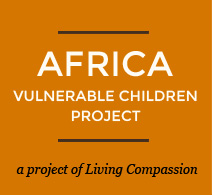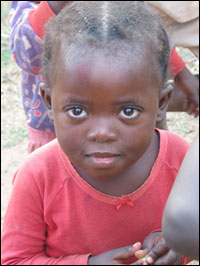
Here is one of the sweet little
people we are doing this for.
After our restful Sunday, we found ourselves eager to jump back into the work week. The day started with a stop at the Deputy District Commissioner’s Office to check in on our application for official NGO (non-governmental organization) status for Living Compassion in Zambia. With the Independence Anniversary approaching (October 24) and the recently held elections, government officials are quite busy, and we were told to return the next day.
We walked across the street to meet with the Town Clerk about our application for the land near Kantolomba to begin the farming program. Nothing in the government offices is computerized, and we found ourselves impressed as person after person pulled one of many ledgers from a shelf, leafed through, and was able to locate an entry indicating which office currently had our application. Alas, when we finally got to the correct office, the designated official was not in. Again, “Come back tomorrow.” Before we left, however, we remembered to inquire about a fellow we had met during our trip in July. He was someone we came across only very briefly while in the Mayor’s office, but we recalled that he had talked about a recycling program. Cheri was sure his name was Patrick, but we could not remember anything else about him: his title, last name, etc. No one in the town clerk’s office could think of who we meant, but when we explained that we were interested in recycling and trash pick-up, they said we must meet Mr. Katota the Head of the Health Department and told us where in the city to find his office.
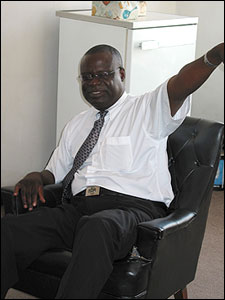 We went straight there where we found Patrick Katota, the very same Patrick. (We often look over our shoulder on these trips, sure we can get a glimpse of our guardian angel.) Patrick is a gentle giant. He is passionate about his job: the public health of the city of Ndola. Heart is what is required to keep a person going in such a job since the government pays very little, pays late and, some months, pays not at all. He patiently listened as we explained our vision to clean up Kantolomba: Designate 2 to 3 acres near the compound to serve as a landfill, hand out thousands of trash bags, organize several days, weeks (whatever it takes) of work, hire trucks and haul all of the garbage to the landfill. He was enthusiastically supportive and asked if we would be willing to change the vision just a bit. His office has just begun using trucks and equipment donated by the Japanese to prepare two major landfill sites in Ndola and begin cleaning up the city. The city’s trucks and the landfill could be used for the job in Kantolomba. Given that this “slight” change in vision stands to save us thousands of dollars, we graciously agreed. Big smiles all around as we realized we share a vision for a clean Ndola. It is only right that a country as beautiful as this should be free of garbage. We agreed to set a meeting on site in Kantolomba to create the plan.
We went straight there where we found Patrick Katota, the very same Patrick. (We often look over our shoulder on these trips, sure we can get a glimpse of our guardian angel.) Patrick is a gentle giant. He is passionate about his job: the public health of the city of Ndola. Heart is what is required to keep a person going in such a job since the government pays very little, pays late and, some months, pays not at all. He patiently listened as we explained our vision to clean up Kantolomba: Designate 2 to 3 acres near the compound to serve as a landfill, hand out thousands of trash bags, organize several days, weeks (whatever it takes) of work, hire trucks and haul all of the garbage to the landfill. He was enthusiastically supportive and asked if we would be willing to change the vision just a bit. His office has just begun using trucks and equipment donated by the Japanese to prepare two major landfill sites in Ndola and begin cleaning up the city. The city’s trucks and the landfill could be used for the job in Kantolomba. Given that this “slight” change in vision stands to save us thousands of dollars, we graciously agreed. Big smiles all around as we realized we share a vision for a clean Ndola. It is only right that a country as beautiful as this should be free of garbage. We agreed to set a meeting on site in Kantolomba to create the plan.
==
We asked Patrick about women we had seen around the city wearing yellow uniforms bearing the slogan: Keep Ndola Clean. He explained they were part of his office’s new clean-up program. He told us the program had started with all men workers (only natural to employ men for such work, right?), but that there had been all kinds of issues with lack of attendance and poor work ethic, and as an experiment he decided to employ women. The results have been dramatic. He says the women are conscientious and seem to care about their work with no need for someone to come behind them “with a whip” (metaphorical, of course).
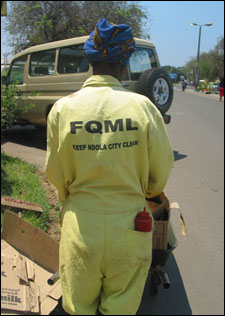
Women street cleaners
Before we parted Patrick offered to escort us to a local shop where the city contracts to buy garbage bags. He introduced us to the storeowner and was able to secure for us the 50% discount the city gets, again, saving us hundreds of dollars. Cheri had the presence to think to ask the owner if he carries black plastic—indeed, in 100-meter roles, as many as we want. Dry houses for everyone in Kantolomba this rainy season!
In the car on the way to drop Patrick back at his office, we learned that he and his wife support 6 orphaned children and plan to raise the number to 17. He will need to get a better paying job to support his dream. We look forward to the day when Living Compassion is financially strong enough to employ people of Patrick’s caliber and offer them a good living. As one of our partners in Canada says, “It is possible to do well while doing good.”
Filled with excitement, we headed to Kantolomba to pick up Theresa. We had an appointment to go to town to do the Kantolomba grocery shopping together. When we arrived at the school, the Coordinator was there. We asked him if the papers to purchase the property for the community center were all prepared. He explained that they were but that the price of the property had increased—from 700,000 kwacha to 3 million kwacha! Without pause we replied that we then did not wish to buy it. It was a hugely disappointing moment for us, but we knew we had no choice but to refuse. Since we are in Kantolomba for the long-term, people need to understand that it will not work to inflate prices and change their minds when doing business with Living Compassion. One day (hopefully in the not-so-distant future) Living Compassion in Zambia will operate without financial support from the West, and so from the beginning it must be run in accordance with the Zambian economy and business practices. Can we afford the 3 million kwacha (around $800)? Yes. But, as we are fond of saying: It’s not what, it’s how.
Feeling both sadness at the set-back and strength in our decision, we started out for our shopping spree. Six shops and two-and-a-half hours later we had an even deeper respect for what Theresa does to make this project happen. 50kg bags of rice, enormous jugs of cooking oil, a whole flat of sugar (we promised Theresa that we are going to help her with a strategy to cut back the amount of sugar the children are used to—something of a national addiction), this was just half of the month’s supply of food. We barely fit it in the back of the Living Compassion vehicle, and Theresa usually does all this by mini-bus. Have we mentioned that she is a hero?
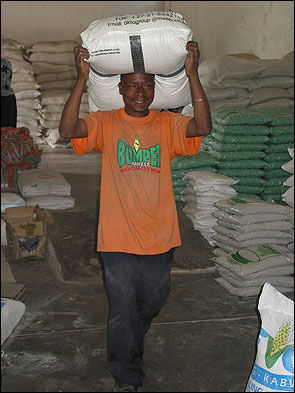
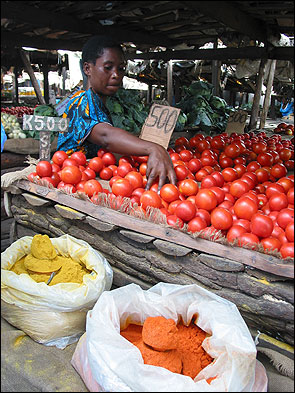
Beauty looks at produce
We brought the groceries back to Kantolomba and delivered them to Beauty’s house to be stored. Beauty is one of the women who volunteers to cook the children’s lunch. She has six children, two grand children and is expecting her seventh child early next year. Though she speaks no English, we love being around her and feel she is becoming a friend.
The Coordinator once again greeted us at the school saying there was another property for sale up the hill in Kantolomba. This property is on the market for 6 million kwacha (around $1600), and we were hesitant to consider it given the price tag. We agreed to drive past. We were pleasantly surprised. As we walked around, we guessed the property is about half an acre. There is one well-built concrete block and stucco construction house and two smaller more traditional mud huts on the plot. It has several beautiful little fences with leafy-green shrubs growing up through them, an avocado tree (!), and much space for building expansion. The land includes a hillside behind the main house. Given the late hour and the fact that we still had to check in with the potter and meet with the teenagers about the focus group, we did not get to explore the area fully but agreed that we would return the next day to look again.
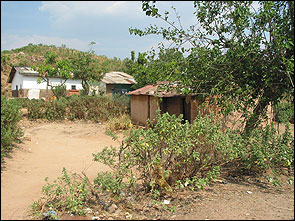
We proceeded to the potter’s house to find dozens more completed pots of various sizes. She is a talented artisan, and the large order Living Compassion has placed has been a catalyst for her to begin to teach her skill to others. It is a win-win for all of us.
Just past 17 hours (five o’clock), the teenagers arrived at the school to share with us the results of their survey. They had gone into the community to test reaction to being asked basic questions about their household for our census. We were amazed to find they had visited around 200 houses and gathered a great deal of data already. They reported that 80% of the people had been very receptive and 20% reticent. After some explanation of the importance of the data, the 20% had agreed to answer the questions, giving the teens a proud 100% response rate. Every time we meet with this group of young people we are more impressed by their initiative and intelligence. We can tell that including youth in the work of Living Compassion will be a key component to success.
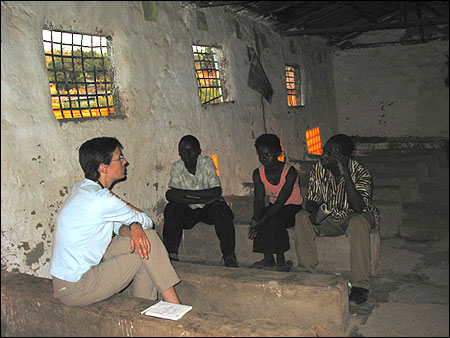
On our way out of Kantolomba we found the RDC (Resident Development Committee) Chairman, who also owns the property we had just seen. We stopped and talked with him about the exciting garbage clean-up vision, arranged a meeting for later in the week to lay out the plan, and asked for details about the property. He is ready to sell and hand-over possession immediately. It was refreshing to do business with him as he was straight-forward and clear about the price—6 million kwacha (again, $1600), for Zambians or mazungas (white people). We told him we would consider it and get back to him.
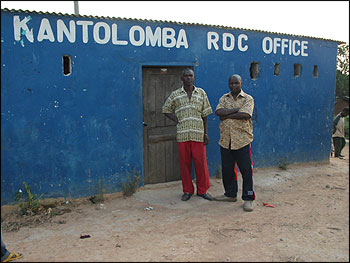
We headed back towards town, dropping Theresa at her house on the way, eager to get home and debrief from another huge day. We prepared a simple but delicious meal, finding creative ways to use leftovers from our dinner out the night before and washed our dishes just in time to fall into bed.
